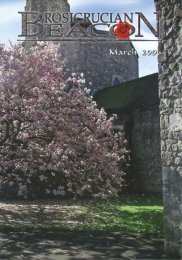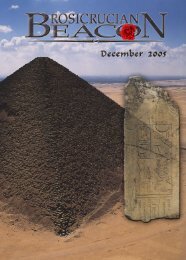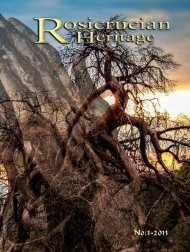Rosicrucian Beacon Magazine - 2010-09 - AMORC
Rosicrucian Beacon Magazine - 2010-09 - AMORC
Rosicrucian Beacon Magazine - 2010-09 - AMORC
You also want an ePaper? Increase the reach of your titles
YUMPU automatically turns print PDFs into web optimized ePapers that Google loves.
The Cosmic Garden: Through Cosmic attunement, all the subtle forces impinging<br />
on the sensitive nerve centres of the human organism give us varied and<br />
multitudinous visions of the land-beyond-the-veil, the veil which separates<br />
our objective consciousness from our subjective consciousness.<br />
organism give us varied and multitudinous visions<br />
of the land-beyond-the-veil, the veil which separates<br />
our objective consciousness from our subjective<br />
consciousness. Who, for example, that has been<br />
privileged to enter the Cosmic Garden can doubt that<br />
it is the archetype of all the particular manifestations of<br />
gardens on the physical plane? In that luminous garden,<br />
vibrant with architectonic and prismatic harmonies “a<br />
light of laughing flowers along the grass is spread…, the soft<br />
sky smiles, the low wind whispers near,” and one senses<br />
part of the divine plan of the great Cosmic Mind of the<br />
Universe.<br />
With Cosmic attunement we are enabled<br />
to penetrate beyond the veil and sense the Ideal<br />
as opposed to the Real, which manifests on<br />
the earth plane as Actuality, or the objective<br />
phenomena of the physical world. The Idea<br />
of the Supreme Mind is creative and manifests first on<br />
the super-physical plane as thought-forms or, as Plato<br />
calls them, Ideas; and later, on the physical plane, as the<br />
objective phenomena of all the outward manifestations<br />
of nature.<br />
The Cosmic Mind<br />
Plato’s Idea is the eternal, the ideal, the universal, the<br />
prototype, the noumenon…, and all physical phenomena<br />
are but the temporal and particular. “As above, so below,”<br />
thought is creative. Let us take a portrait painted as a<br />
concrete example of the creative power of the human<br />
mind. What is the power behind this picture? Surely not<br />
the pigment, not the canvas, not the brush…, these are but<br />
instruments in the guiding hand of the artist who brings<br />
to fruition his Idea, his idea of colour, form, proportion<br />
and harmony, plus the personality of the sitter.<br />
In the realm of abstract qualities or activities of the<br />
Soul such as goodness, justice, temperance, beauty, truth<br />
and so on…, for this seer of the invisible, there is a norm<br />
or pattern inherent in the human mind and deriving from<br />
the Universal Mind, against which, and with which, one<br />
judges all particular manifestations of these qualities.<br />
These transcendental Realities or Ideas are eternal<br />
conceptions in the Cosmic Mind. And it is only by<br />
refining, by a constant process of dialectical inclusion<br />
and exclusion of definition, that we may hope to attain<br />
to an approximate comprehension thereof. This inward<br />
dialectic is the birthright of every individual, and its<br />
spokespersons are the two inner voices which are never<br />
silent, but are constantly defining, analysing, weighing,<br />
judging, accepting or rejecting, by the power of reason<br />
vouchsafed to us by the Divine Mind.<br />
The Human Mind<br />
Are we not all sparks of the Divine Fire? Are we<br />
not individual souls depending upon, and drawing<br />
inspiration from, the great Oversoul of the Universe?<br />
And can we not by loving search, partake in some measure<br />
of the ineffable wisdom, and approach in thought to the<br />
intellectual beauty of perfect justice, perfect truth, and<br />
the other virtues?<br />
In his Dialogues, Plato makes his beloved Master,<br />
Socrates, “that old gadfly who brings souls to birth,” the<br />
arbiter and judge of all the definitions of abstract qualities<br />
These transcendental Realities or Ideas are eternal<br />
conceptions in the Cosmic Mind.<br />
brought forward by his listeners. For Socrates, the human<br />
mind and reason are much more worthy of study than<br />
the physical world around us, and this is expressed in his<br />
famous dictum, “Know Thyself.” He himself professes to<br />
know nothing, but only to be a lover of wisdom. And he<br />
occupies himself with the eternal verities, those Ideas of<br />
all the intellectual abstractions which form the subjectmatter<br />
of Plato’s Dialogues. For Plato, as for Socrates, the<br />
supreme Idea is the Idea of the Absolute Good, or God,<br />
the essential unity in-variety of all that IS.<br />
Endnotes<br />
1. Percept: The representation of what is perceived; a basic<br />
component in the formation of a concept.<br />
2. Noumenon: The intellectual conception of a thing as it is<br />
in itself, not as it is known through perception.<br />
The <strong>Rosicrucian</strong> <strong>Beacon</strong> -- September <strong>2010</strong><br />
19











